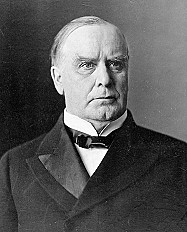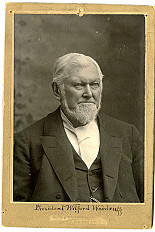
Day in the Life
Journal Entry
January 23, 1897 ~ Saturday
23 I spent the day at home resting
Related Documents
Browse other documents with this same date. These could include pages from Wilford Woodruff's autobiographies, daybooks, letters, histories, and personal papers. Click on the document titles to view the full document.

President Wilford Woodruff
Salt Lake City, Utah.
Dear Brother,
Yours of 16th inst. duly
receieved and noted, in which you
state that my name has been suggested
and accepted as a missionary, and you
wish to know my feelings in regards to
the matter, also if I can be ready to leave
Salt Lake by the 15th of April.
I feel to thank God that I am considered
worthy of filling such a responsible
a possition, and my most ardent prayer
is that I will be an earnest worker and
fulfill an honorable msission. God
being my helper I am willing to
make a trial, you can expect me
to be on hand to be set apart as required.

Letter from Briant Stringham Young, 23 January 1897
Lehi, Utah, .
HON. WILFORD WOODRUFF,
Prest. Church of J. C. of L.D.S.,
Salt Lake City, Utah.
Respected Sir;—It was with the deepest interest that I read in
this mornings ^p^aper, of an interview published therein, regarding your-
self and the members of the Semi-centennial Celebration which is to
take place this year, and noting that Judge Colborn was the main
apeaker for the committie, and noting that you were in favor of giving
said committe $10,000 to aid them in the celebration, I address you
relative to the matter, and call your attenti^o^n to a few facts of which
you may not be aware.
In the first place, does it not appear that we have nmany of Utah's
sons, members of the church who are as capable, and even more so, of
attending this afafair, without the guidance of such as man as Colborn.
While true he was appointed by the governor, I yet must candidly con-
fess that it reflects no great credit on the govrernor, for this man Col-
burn came to Utah during the I"boom" and it was such men as him, that
constituted the "Liberal" party that were so harsch in their condem-
nation of the church, and its follwers. It was such men was him, that
have never done anything for Utah or your city, but that it helped
them first. Can it be said that Utah must needs accept the services
of outsiders, to portray the efforts of Utah's pioneers, when in fact
they know nothing of it, beyond what they may read, or hear, and then-
in what do^i^storted, irrelevant manner?
Last season, when that Mid-summer Carnival was given, I was at a
meeting at which this man arose, and delivered an address, during which
he used worss [words] to the effect that he "was tired of seeing home faces, and
we wanted outsiders to come in and get the benefits" or words to that
effect.
Then there is another man on that committee, whom I know well, that
is E. G. Rognon. He is a good, smart young man, but he inssn't a n[a]tive
of Utah, neither does he represent her, beyond what affects his interests.
Now then, I ask you candidly, do you think these the kind of men
to handle money to represent Utahs great celebartion, and to handle the
money of the people whom they slightlingly designate as "Mormons?"
I am addressing this letter to you, generally, but while I speak for
others, I confess I speak as much for myself.
I am a Utah boy; born of its greatedst people; a grand-son of
Brigham Young, and son of Jos. A. Young, men who have liaaid ^down^ their lives
and liberties on behalf of our church and its noble work. I fought in
the great Peoples-Liberal party campaign, six years ago, and though I
was a humble worker, my work was at least sincere. I carried a drum,
and I hammered at it too, and had all the others made as much noise as
I tried to do, the echo of our great vistory (instead of defeat) would go
down into counlttless ages. Two years ago, nearly three, I—with some
other ^y^oung men, received permission to use the Bee-hive house for a
demonstaration for the old pioneers. It was given, and 800 of them
were entertianed, and lived again in the days of long ago. Bill^s^ on
that occasion, were a matter of necesskity contracted, and one of
them, I have been sued for, and the judgement entered against me, be-
cause I have been unable to pay it. Now, do you call this just? What
benefit did I—or any of us get from it? Nothing but that—which is more
money than money can ever buy—tears of gratitude from old eyes, and
from old lips, and old forms, within the shadow of the grave, blessed
and thanked us for what we done. And that night too, did I not act as
mediator? R. N. Baskin, at that time mayor, on my personal solicitation
attended, and for the first time in his life, commingled with the
"hated Mormons" and grasped them hand to had [hand]
Now then, again I ask, why are such men as this allowed these
things?
Can Utah not furnish brains and muscle enough, to dispense with the
services of these outsiders. Ten, twelve, fifteen years ago, when our

Letter from William Campbell McGregor, 23 January 1897
Logan,
Pres Wilford Woodruff,
Salt Lake City,
Dear Brother:
A mission to Tahiti is
accepted, and I will be inat
the Historian's Office on the
day appointed.
I shall be pleased if
you will let me know at
what date I will need to be
at the Historian's Office.
Your Brother
William McGregor.
Logan,
Utah.
R H Williams Jr

Letter from Walter J. Knell, 23 January 1897
Pinto, .
Pres. Wilford Woodruff
Salt Lake City, Utah.
Dear Brother:
Yours of Jan. 16th Rec'd today
In reply will say, there are no
reasonable obstacles to hinder me
from going, unless it be in-
competency to teach and explain
the principles of the Everlasting
Gospel. I am willing to
go and do the best I can.
Your Brother in the Gospel,
Walter J. Knell.
Robert Knell
Bishop
Events
View selected events in the two months surrounding this date in Wilford Woodruff's life. Click on the dates to jump to that day in Wilford Woodruff's journal.

Wilford attends the celebration of his 90th birthday in the Tabernacle.

William McKinley inaugurated as 25th President of 45 United States.

Wilford records his testimony (only known recording of his voice).